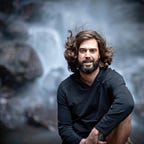Exploring Food & Story
The future is broken. For all our technological advances and consumer comforts, the future of humanity, our future, stands at a crossroads. Simple changes are not going to be enough. The problems we face are deeper than that. They stem from the stories we tell ourselves. Stories about life and humanity. Stories about the world and all of existence.
Our current story is one of humanity at the apex of evolution. Of man in control. The most intelligent life on the planet. Able to solve any and all problems through science, analysis and critical thought. It is the story of an accidental, mechanistic world. And it is a story that has served us very well for centuries. It has allowed us to escape the strictly defined realities of the church. To explore the world with new vision, with open eyes. To build great cities and societies. To make technological innovations that would have been unimaginable only decades ago.
But, this is also a story that has taken us away from the natural world. Away from meaning and connection. It is a story that has made us arrogant, confident in our ability to break complex problems down into manageable sizes, too often ignorant of the reality that, in doing so, we create a false sense of certainty in our answers. Problems do not exist in isolation in nature, nothing does.
The reality is that this is a story that, as Joanna Macy puts it, has allowed humanity to treat the earth as little more than a “supply house and a sewer”. Is it any wonder then, that this story is unravelling before our very eyes? That our technological and scientific achievements, developed as a result of our current story, are now pointing to our own demise? That we can see, with terrifying clarity, our impending, self inflicted destruction?
It is here that we are faced with two choices. The first is to simply continue on with our current story. To believe that we have to do things bigger and better if we have any hope of survival. To continue to believe in one size fits all, silver bullet solutions, like genetically modified organisms, chemical fertilisers, pesticides and herbicides, more monocultures. Simple solutions that continue to ignore their broader systemic impacts.
The other choice is to take onboard the words of Albert Einstein and understand that “problems cannot be solved with the same mindset that created them“. That humanity needs a new story. A story that places nature at the centre of our worldview. A story of ecocentrism.
Ecocentrism is in many ways many ways the counterpoint to our current story. It is a story of diversity and complexity. Of local solutions to local problems. Of empowered individuals and communities. In terms of agriculture, it is a story of biological richness and depth. Of nature in control. Of humanity working within natural systems. Of regeneration not degradation. It is a story of observation and awe. Of reverence and reciprocity. Most importantly, it is a story of humility.
Let’s be very clear here, changing stories does not mean going back to the past. Going backwards is never an option. This is still a story that must be grounded in science and technology as critical tools for guiding our course. But equally, it is a story that is also grounded in the understanding that, for all our knowledge, there is still so much that we do not know and understand. Instead of being scared of this reality, ecocentrism celebrates it, reconnecting us to the wonder of the world around us, the world within us, the world that is us.
Today we stand at a crossroads. We must decide whether we believe in the current human (or ego)-centric story or a new ecological (or eco)–centric story? The system is the current story. Make no mistake, changing stories requires a complete paradigm shift. It will be anything but easy.
Thankfully, the stories of ecocentrism are already being told, by increasing numbers and at greater volumes. In terms of the food system, these stories are, by necessity, diverse. They are the stories of agroecology and permaculture. Of slow food and the new generation of greenhorn farmers. They are local farmers markets and heritage seeds. Community gardens and the sharing economy. They are stories being told by people, not corporations. Stories of health and vitality. But most of all, they are stories of hope.
